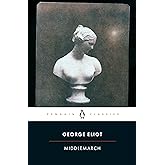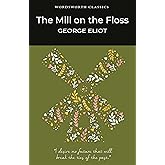
Download the free Kindle app and start reading Kindle books instantly on your smartphone, tablet, or computer - no Kindle device required.
Read instantly on your browser with Kindle for Web.
Using your mobile phone camera - scan the code below and download the Kindle app.

OK
 Audible sample Sample
Audible sample Sample 


The Mill on the Floss (Dover Thrift Editions) Paperback – July 25, 2003
- Print length416 pages
- LanguageEnglish
- PublisherDover Publications
- Publication dateJuly 25, 2003
- Reading age14 years and up
- Dimensions5.25 x 1 x 8.25 inches
- ISBN-100486426807
- ISBN-13978-0486426808
The Amazon Book Review
Book recommendations, author interviews, editors' picks, and more. Read it now.
Similar items that may deliver to you quickly
Editorial Reviews
About the Author
Born in 1819, Mary Ann Evans adopted a man's pen name to make sure that her books were taken seriously. As George Eliot, she became one of the Victorian era's most prominent novelists. Eliot's stories continue to captivate readers with their readable style and the warmth and humanity of their characters.
Product details
- Publisher : Dover Publications (July 25, 2003)
- Language : English
- Paperback : 416 pages
- ISBN-10 : 0486426807
- ISBN-13 : 978-0486426808
- Reading age : 14 years and up
- Item Weight : 12 ounces
- Dimensions : 5.25 x 1 x 8.25 inches
- Best Sellers Rank: #4,575,849 in Books (See Top 100 in Books)
- #82,477 in Classic Literature & Fiction
- Customer Reviews:
About the author

Mary Ann Evans (22 November 1819 - 22 December 1880; alternatively "Mary Anne" or "Marian"), known by her pen name George Eliot, was an English novelist, poet, journalist, translator and one of the leading writers of the Victorian era. She is the author of seven novels, including Adam Bede (1859), The Mill on the Floss (1860), Silas Marner (1861), Felix Holt, the Radical (1866), Middlemarch (1871-72), and Daniel Deronda (1876), most of them set in provincial England and known for their realism and psychological insight.
She used a male pen name, she said, to ensure her works would be taken seriously. Female authors were published under their own names during Eliot's life, but she wanted to escape the stereotype of women only writing lighthearted romances. She also wished to have her fiction judged separately from her already extensive and widely known work as an editor and critic. An additional factor in her use of a pen name may have been a desire to shield her private life from public scrutiny and to prevent scandals attending her relationship with the married George Henry Lewes, with whom she lived for over 20 years.
Her 1872 work Middlemarch has been described by Martin Amis and Julian Barnes as the greatest novel in the English language.
Bio from Wikipedia, the free encyclopedia. Photo by Swiss artist Alexandre-Louis-François d'Albert-Durade (1804-86) [Public Domain], via English Wikipedia.
Customer reviews
Customer Reviews, including Product Star Ratings help customers to learn more about the product and decide whether it is the right product for them.
To calculate the overall star rating and percentage breakdown by star, we don’t use a simple average. Instead, our system considers things like how recent a review is and if the reviewer bought the item on Amazon. It also analyzed reviews to verify trustworthiness.
Learn more how customers reviews work on AmazonReviews with images
-
Top reviews
Top reviews from the United States
There was a problem filtering reviews right now. Please try again later.
I was wrong, in fact. The book's a tragedy, but it has a cozy, cheery ending for a tragedy. I felt better when the book was over. I forgot how good Victorians were at writing upbeat endings, even in their saddest stuff. I forgot, too, that there's a large mixture of dialect comedy in the book, along with excellent suspense, so Eliot knows how to keep her readers laughing and stay popular. She made a fortune off this book.
But let's look at some complaints that have been made. The heroine, Maggie Tulliver, is extremely bright -- and as a woman, she can't be sent to school by her rich but totally unintellectual country parents. Her much dumber brother is sent to school, hates school but ends up making good money, misunderstands and refuses to speak to his intelligent sister.
That is the theme of the book: how the brother hurts the sister because he is a practical man who doesn't understand or respect intelligence. The reader has her nose rubbed in this theme from the beginning to the end. At the beginning, nine-year-old Maggie absent-mindedly forgets all about the rabbits her thirteen-year-old brother asked her to look after while he was away. He asked another farmworker to look after them too, and the farmworker also forgot. The unreliable farmworker is (to the brother) just a loser employee, but Maggie he punishes for her absent-mindedness. He refuses to speak to her, and of course the reader is very close to being on the brother's side. The rabbits die. They don't get saved by luck or by some other guy. They die of starvation.
In other words, Eliot does not desert her theme or cover it with sugar. Intelligent girls can be absent-minded to a murderous degree, and no one thinks girls deserve an education in any case. A practical money-making man is obviously superior to a dreamy girl who deserves no education in the first place. Look: the girl kills rabbits! The boy gets practical things done! Maybe, reader, you'll agree that the girl would be better off dead.
That's how deep the hook is sunk to begin with, and the following narrative only sinks it deeper. When she grows up, Maggie commits herself to an intelligent hunchback, but then falls in lust with a handsome, shallow man who likes her looks. Maggie's love is wrong. She knows that with her head and heart, but her head and heart aren't all there is to her. She wants the guy. Obviously, and many readers agreed at the time the book was written, and still agree now, Maggie is no good. She's slutty. She would be better off never having been born. When her brother got mad at her about the rabbits, he forgave her because he was thirteen and because, among tough country people, dead rabbits don't register very heavily. But when he's an adult and she's a slut, he never speaks to her again, just like George Eliot's own brother never spoke to her again when she started living with a married man.
That is the theme of the book. The theme of the book is not that intelligent women are lovable because they're so smart and never act slutty because, at nineteen, their passions are totally under their intelligent control. Jane Austen's themes are a tiny little bit like that, because she doesn't mind always leading up to a happy marriage (and I underline _always_). Eliot wanted to make a slightly different point: you don't have to like us, but don't you have to let us live? Can't we, like men, do some good even when we're bad guys in the bedroom and don't much care about cute little animals?
The struggle to ask these questions makes this a scary book. The reader is afraid she will be hurt and disgusted even more than she has been already. In fact, the book ends tragically but calmingly.
Or does it ever end? People complain that Eliot moralizes too much, but how can she have moralized too much when the moral point she wanted to make is still not made, when her heroine Maggie is still seen by some as a dislikeable rabbit-killing slut, a century and a half after she was created? How can Eliot have argued too much when all her argument failed to get her point across?
Perhaps her point will always fail to get across. That would be sadder than THE MILL ON THE FLOSS.
The novel traces Maggie’s growth from childhood to young adulthood and her “yearning for something that would … give her a sense of home.” This journey leads Maggie to a series of hard choices that set her individual desires against family, honor, tradition and small-town English values, or what Eliot calls the “dead level of provincial existence.” It all comes to a flashpoint when Maggie falls in love with the one boy no one wants to see her with.
In contrast to Maggie is her brother, Tom, a boy who “was particularly clear and positive on one point – namely, that he would punish everybody who deserved it.” The siblings' complex relationship lies at the heart of the novel, even more so than Maggie’s love affair. Tom’s unrelenting and self-righteous focus eventually turns its attention to Maggie, with tragic results.
A complicated book that doesn’t let the reader or its characters off easy, “The Mill on the Floss” deceives with what, for Eliot at least, seems a straightforward narrative. (To be sure, the book features about half-a-dozen important players, each with a story of his or her own, but it’s nowhere as involved as “Middlemarch.”) The challenge comes in reconciling Eliot’s take on Maggie’s struggle toward self-realization in the face of societal pressures – or what Eliot sums up as “the great problem of the shifting relation between passion and duty” – with our own, 21st-century “selfie” perspective that values individuality above all else. Even though this is one of literature’s great stories of a woman finding her true voice, “The Mill on the Floss” seems, ultimately, to say that comes with a heavy price that may not be worth paying.
That’s heavy stuff. Nonetheless, if you’re looking to tackle Eliot’s works, this makes the perfect introduction, along with “Silas Marner," before graduating to "Middlemarch." Both capture the essence of Eliot’s style and vision in quick, easy reads. Unlike, say, Eliot’s contemporary William Makepeace Thackeray, whose pen dripped with sarcasm and at times outright disdain for his characters, Eliot loves her creations – even when they make stupid choices – and writes from a self-confessed “strong sympathy” for them. As a result, the reader cares for Eliot’s creations. Maggie and Tom Tulliver will haunt you long after you’ve finished reading this novel.
Top reviews from other countries
Reviewed in India on January 26, 2024

A tale that grew as the reading progressed.
Must be read again.













